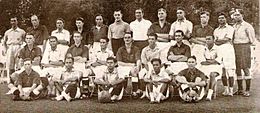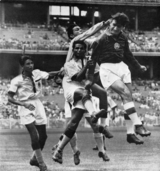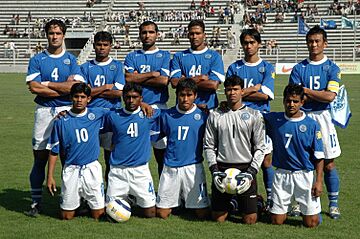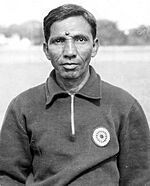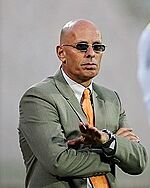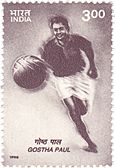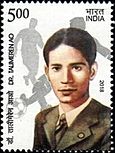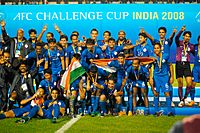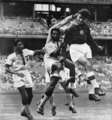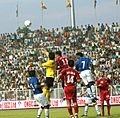India national football team facts for kids
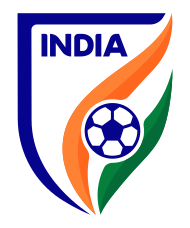 |
||||||||||||||||||||||||||||||||||||||||||||||||||||||||||||||||||||||||||||||||||||||||||||
| Nickname(s) | The Blue Tigers | |||||||||||||||||||||||||||||||||||||||||||||||||||||||||||||||||||||||||||||||||||||||||||
|---|---|---|---|---|---|---|---|---|---|---|---|---|---|---|---|---|---|---|---|---|---|---|---|---|---|---|---|---|---|---|---|---|---|---|---|---|---|---|---|---|---|---|---|---|---|---|---|---|---|---|---|---|---|---|---|---|---|---|---|---|---|---|---|---|---|---|---|---|---|---|---|---|---|---|---|---|---|---|---|---|---|---|---|---|---|---|---|---|---|---|---|---|
| Association | All India Football Federation (AIFF) | |||||||||||||||||||||||||||||||||||||||||||||||||||||||||||||||||||||||||||||||||||||||||||
| Confederation | AFC (Asia) | |||||||||||||||||||||||||||||||||||||||||||||||||||||||||||||||||||||||||||||||||||||||||||
| Sub-confederation | SAFF (South Asia) | |||||||||||||||||||||||||||||||||||||||||||||||||||||||||||||||||||||||||||||||||||||||||||
| Head coach | Vacant | |||||||||||||||||||||||||||||||||||||||||||||||||||||||||||||||||||||||||||||||||||||||||||
| Captain | Sandesh Jhingan | |||||||||||||||||||||||||||||||||||||||||||||||||||||||||||||||||||||||||||||||||||||||||||
| Most caps | Sunil Chhetri (155) | |||||||||||||||||||||||||||||||||||||||||||||||||||||||||||||||||||||||||||||||||||||||||||
| Top scorer | Sunil Chhetri (95) | |||||||||||||||||||||||||||||||||||||||||||||||||||||||||||||||||||||||||||||||||||||||||||
| Home stadium | Various | |||||||||||||||||||||||||||||||||||||||||||||||||||||||||||||||||||||||||||||||||||||||||||
| FIFA code | IND | |||||||||||||||||||||||||||||||||||||||||||||||||||||||||||||||||||||||||||||||||||||||||||
|
||||||||||||||||||||||||||||||||||||||||||||||||||||||||||||||||||||||||||||||||||||||||||||
| FIFA ranking | ||||||||||||||||||||||||||||||||||||||||||||||||||||||||||||||||||||||||||||||||||||||||||||
| Current | 103 |
|||||||||||||||||||||||||||||||||||||||||||||||||||||||||||||||||||||||||||||||||||||||||||
| Highest | 94 (February 1996) | |||||||||||||||||||||||||||||||||||||||||||||||||||||||||||||||||||||||||||||||||||||||||||
| Lowest | 173 (March 2015) | |||||||||||||||||||||||||||||||||||||||||||||||||||||||||||||||||||||||||||||||||||||||||||
| Elo ranking | ||||||||||||||||||||||||||||||||||||||||||||||||||||||||||||||||||||||||||||||||||||||||||||
| Current | 150 |
|||||||||||||||||||||||||||||||||||||||||||||||||||||||||||||||||||||||||||||||||||||||||||
| Highest | 30 (March 1952) | |||||||||||||||||||||||||||||||||||||||||||||||||||||||||||||||||||||||||||||||||||||||||||
| Lowest | 186 (September 2015) | |||||||||||||||||||||||||||||||||||||||||||||||||||||||||||||||||||||||||||||||||||||||||||
| First international | ||||||||||||||||||||||||||||||||||||||||||||||||||||||||||||||||||||||||||||||||||||||||||||
| Pre-independence: (Sydney, Australia; 3 September 1938) Post-independence: (London, England; 31 July 1948) |
||||||||||||||||||||||||||||||||||||||||||||||||||||||||||||||||||||||||||||||||||||||||||||
| Biggest win | ||||||||||||||||||||||||||||||||||||||||||||||||||||||||||||||||||||||||||||||||||||||||||||
(Bangaluru, India; 7 December 1963) |
||||||||||||||||||||||||||||||||||||||||||||||||||||||||||||||||||||||||||||||||||||||||||||
| Biggest defeat | ||||||||||||||||||||||||||||||||||||||||||||||||||||||||||||||||||||||||||||||||||||||||||||
(Moscow, Soviet Union; 16 September 1955) |
||||||||||||||||||||||||||||||||||||||||||||||||||||||||||||||||||||||||||||||||||||||||||||
| Olympic Games | ||||||||||||||||||||||||||||||||||||||||||||||||||||||||||||||||||||||||||||||||||||||||||||
| Appearances | 4 (first in 1948) | |||||||||||||||||||||||||||||||||||||||||||||||||||||||||||||||||||||||||||||||||||||||||||
| Best result | Fourth place (1956) | |||||||||||||||||||||||||||||||||||||||||||||||||||||||||||||||||||||||||||||||||||||||||||
| Asian Cup | ||||||||||||||||||||||||||||||||||||||||||||||||||||||||||||||||||||||||||||||||||||||||||||
| Appearances | 5 (first in 1964) | |||||||||||||||||||||||||||||||||||||||||||||||||||||||||||||||||||||||||||||||||||||||||||
| Best result | Runners-up (1964) | |||||||||||||||||||||||||||||||||||||||||||||||||||||||||||||||||||||||||||||||||||||||||||
| AFC Challenge Cup | ||||||||||||||||||||||||||||||||||||||||||||||||||||||||||||||||||||||||||||||||||||||||||||
| Appearances | 2 (first in 2008) | |||||||||||||||||||||||||||||||||||||||||||||||||||||||||||||||||||||||||||||||||||||||||||
| Best result | Champions (2008) | |||||||||||||||||||||||||||||||||||||||||||||||||||||||||||||||||||||||||||||||||||||||||||
|
Medal record
|
||||||||||||||||||||||||||||||||||||||||||||||||||||||||||||||||||||||||||||||||||||||||||||
The India national football team plays for India in men's international football. It is managed by the All India Football Federation (AIFF). The team is part of FIFA, the AFC, and the SAFF.
India is known as the best football team in South Asia. They won two gold medals at the 1951 and 1962 Asian Games. They also finished fourth at the 1956 Summer Olympics.
India has never played in the FIFA World Cup. They did qualify for the 1950 World Cup by default. This happened because other teams in their group pulled out. However, India also withdrew before the tournament started.
The team has played in the AFC Asian Cup, Asia's top football event, five times. They finished second in 1964. India also plays in the SAFF Championship, the main regional competition in South Asia. They have won this tournament a record eight times since it began in 1993.
In the 2000s, besides winning the SAFF Championship, India also won the Nehru Cup in 2007 and 2009. They also won the 2008 AFC Challenge Cup. This win helped them qualify for the Asian Cup after 27 years.
Contents
India's Football Journey
Early Days (1930s–1940s)
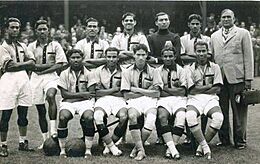
The Indian football team first traveled outside India to Ceylon (now Sri Lanka) in 1933. They won their first match there 1–0. This team was mostly from Bengal, but it represented India.
In 1938, India toured Australia at the request of the Australian Football Association. They played 17 matches against local teams and 5 friendly games against the Australian national team. Their first official international game, recognized by FIFA, was on September 3 in Sydney. India lost 5–3. They drew the second match 4–4 in Brisbane. Then, they won their first international game 4–1 in Newcastle.
After India became independent, the national team played its first match in the 1948 Summer Olympics. They lost 2–1 to France. Interestingly, the Indian team played either barefoot or in socks. FIFA later banned this practice.
Golden Era (1950s–1960s)
In 1950, India qualified for the 1950 FIFA World Cup in Brazil. This happened because all other teams in their group pulled out. However, India also withdrew before the tournament. The official reason was travel costs, but FIFA had offered to pay. Many believe India withdrew because they valued the Olympics more than the World Cup. They didn't think the World Cup was important enough. India has not qualified for another World Cup since.
The years until 1964 are called the "golden era" of Indian football. India, coached by Syed Abdul Rahim, became one of Asia's best teams. In March 1951, Rahim led India to win their first trophy at the 1951 Asian Games in India. They beat Iran 1–0 in the final. Sahu Mewalal scored the winning goal.
In 1952, India played in the 1952 Summer Olympics in Helsinki. They lost 10–1 to Yugoslavia because they were not used to the cold weather. After this loss, the AIFF made it mandatory for players to wear boots. India then won the Asian Quadrangular Football Tournament four times from 1952 to 1955.
In 1954, India returned to the Asian Games as champions. But they could not get past the group stage. Two years later, at the 1956 Summer Olympics, India achieved their best result in a major tournament. They finished fourth, losing the bronze medal match to Bulgaria 3–0. Neville D'Souza scored a hat-trick against Australia in the quarterfinals. This was the first hat-trick by an Asian player in Olympic history. India beat Australia 4–2 in that game.

India finished fourth again at the 1958 Asian Games in Tokyo. They lost the bronze medal match to Indonesia 4–1. The next year, they finished second in the 1959 Merdeka tournament in Malaysia.
India started the 1960s with the 1960 AFC Asian Cup qualifiers. They finished last in their group and missed the tournament. However, India won their second gold medal at the Asian Games in 1962. They beat South Korea 2–1 in the final.
In 1964, India played in the 1964 AFC Asian Cup. They got in automatically because other teams withdrew. India finished second in the tournament, just two points behind hosts Israel. This is still India's best performance in the AFC Asian Cup.
Challenges (1970s–2000)
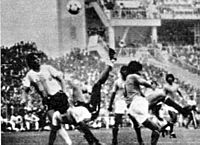
India played in the Asian Games again in 1966. They couldn't get past the group stage. Four years later, at the 1970 Asian Games, India won the bronze medal. They beat Japan 1–0 in the third-place match.
In 1974, India's performance dropped sharply at the 1974 event. They lost all three matches in their group. India improved at the 1978 tournament, finishing second in their group. But they were knocked out in the next round. The 1982 tournament was better. India reached the quarter-finals but lost 1–0 to Saudi Arabia.
In 1984, India qualified for the AFC Asian Cup for the first time since 1964. At the 1984 tournament, India finished last in their group. Their only draw was 0–0 against Iran.
Even though India was no longer a top football power in Asia, they remained strong in South Asia. India won the football competition at the South Asian Games in 1985 and 1987. They then won the first SAFF Championship in 1993. In February 1996, India reached its highest FIFA ranking of 94. They ended the 20th century by winning the SAFF Championship again in 1997 and 1999.
Comeback (2001–2011)
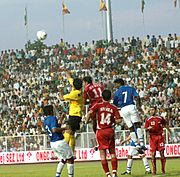
India started the 21st century with the 2002 FIFA World Cup qualifiers. They had a good start, beating the United Arab Emirates 1–0 and drawing Yemen 1–1. They also beat Brunei twice, including a 5–0 win. But they missed qualifying for the next round by one point. In 2003, India reached the semi-finals of the 2003 SAFF Championship but lost to Bangladesh 2–1.
Later in 2003, India played in the Afro-Asian Games in Hyderabad. Coached by Stephen Constantine, India reached the final. They beat Zimbabwe, a much higher-ranked team, 5–3. In the final, India lost 1–0 to Uzbekistan. This achievement brought India more recognition.
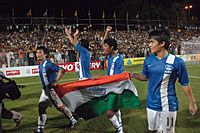
Stephen Constantine was replaced by Syed Nayeemuddin in 2005. But India suffered many heavy defeats in the 2007 AFC Asian Cup qualifiers. They lost 6–0 to Japan and 3–0 to Saudi Arabia. In May 2006, Bob Houghton became the new head coach.
Under Houghton, Indian football improved a lot. In August 2007, India won the Nehru Cup by beating Syria 1–0 in the final. The next year, Houghton led India to win the 2008 AFC Challenge Cup at home. In the final, Sunil Chhetri scored three goals, and India won 4–1 against Tajikistan. This win allowed India to qualify for the 2011 AFC Asian Cup, their first Asian Cup in 27 years. To prepare, Houghton kept the team together for eight months.
At the Asian Cup, India was in a tough group with Australia, South Korea, and Bahrain. India lost all three matches, including a 4–0 defeat to Australia. Despite the losses, fans praised India's effort.
Recent Years (2011–Present)
After the 2011 AFC Asian Cup, India started its journey to qualify for the 2015 Asian Cup. Bob Houghton changed the team, bringing in younger players. India qualified for the AFC Challenge Cup. However, the AIFF ended Bob Houghton's contract.
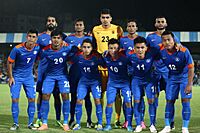
After a temporary coach, Savio Medeira became head coach in October 2011. Medeira led India to another SAFF Championship win. But they had their worst performance in the AFC Challenge Cup, losing all three matches without scoring. After this, Wim Koevermans became head coach. India won their third Nehru Cup under him, beating Cameroon on penalties.
In March 2013, India failed to qualify for the 2014 AFC Challenge Cup and thus the 2015 AFC Asian Cup. They also lost the 2013 final 2–0 to Afghanistan. Wim Koevermans resigned in October 2014.
By March 2015, India reached its lowest FIFA ranking of 173. A few months earlier, Stephen Constantine returned as head coach. His first big task was the 2018 FIFA World Cup qualifiers. India made it through the first round but lost seven of eight matches in the second round. They did not qualify for the World Cup.

However, India qualified for the 2019 AFC Asian Cup after beating Laos. On October 11, 2017, India secured their spot with a 4–1 win over Macau. In 2017, India was unbeaten, winning seven games and drawing two. This helped them reach a FIFA ranking of 96 in May, their second-highest ever.
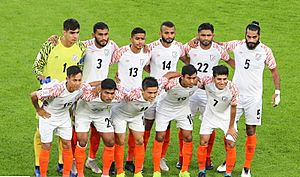
In September 2018, India lost the 2018 SAFF Championship final 2–1 to Maldives. But they bounced back with friendly matches against China, Jordan, and Oman. They started the 2019 AFC Asian Cup with a big 4–1 win against Thailand. This was their largest win ever at the Asia Cup and their first in 55 years. However, they lost their next two group matches and did not reach the knockout stage. Stephen Constantine resigned after the tournament.
On May 15, 2019, Igor Štimac became the new head coach. His first big challenge was the 2022 World Cup qualification. India lost 2–1 at home to Oman. But they earned a good draw, 0–0, against Qatar, the 2019 Asian Champions. They then drew 1–1 with Bangladesh and Afghanistan. India lost to Oman again, which hurt their chances for the next round. Due to COVID-19, the remaining games were played in Doha. India lost to Qatar and was out of the World Cup qualification. They then beat Bangladesh 2–0 and drew 1–1 with Afghanistan. India finished third in their group and qualified for the third round of the 2023 AFC Asian Cup qualification.
In the third round of qualifiers, India was in a group with Afghanistan, Hong Kong, and Cambodia. India hosted the games and topped the group with three wins. They beat Cambodia (2–0), Afghanistan (2–1), and Hong Kong (4–0). This meant India qualified for two Asian Cups in a row for the first time ever.
In September 2022, India played in the 2022 VFF Tri-Nations Series for the first time. They drew 1–1 with Singapore and lost 3–0 to Vietnam. In 2023, India won the 2023 Tri-Nation Series and the 2023 Intercontinental Cup. They beat Myanmar 1–0 and Kyrgyzstan 2–0 in the Tri-Nation series. They defeated Lebanon 2–0 in the Intercontinental Cup final.

After these wins, India won the 2023 SAFF Championship, their third title in 2023. They beat Pakistan 4–0 and Nepal 2–0. They drew 1–1 with Kuwait in the group stage. In the semi-finals, India beat Lebanon in a penalty shoot-out. They faced Kuwait again in the final. The match was tied 1–1, and India won in a penalty shoot-out. This was their record ninth SAFF Cup title. Sunil Chhetri was the top scorer with 5 goals, including a hat-trick against Pakistan. This hat-trick was his fourth for the national team. With 92 goals, he became the second-highest international goalscorer from Asia. He is the fourth-highest goalscorer in international football history.
At the 2023 AFC Asian Cup tournament, India was the only team without any friendly matches to prepare. They lost all their group matches: 0–2 to Australia, 0–3 to Uzbekistan, and 0–1 to Syria. They did not score any goals.
In the 2026 World Cup qualification, India was in a group with Afghanistan, Kuwait, and Qatar. India started by beating Kuwait 1–0, their only win in the group. After that, their performance declined. They lost to Qatar (0–3 and 1–2) and had a surprising 2–1 loss to Afghanistan. They also drew 0–0 with Kuwait and Afghanistan. India finished third in the group and did not qualify for the next round.
On June 17, 2024, the AIFF ended Štimac's contract.
New Coach (2024–)
On July 20, 2024, the AIFF announced that Manolo Márquez would be the new head coach. He also continues his work with FC Goa. His first tournament was the 2024 Intercontinental Cup against Mauritius and Syria.
Marquez's first win came on March 19, 2025. India beat Maldives 3–0 with goals from Rahul Bheke, Liston Colaco, and Sunil Chhetri. This win ended the team's 489-day streak without a victory.
Team Identity
Nicknames
India's team is officially called The Blue Tigers since 2013. This name comes from the blue color of their home kit, which is like the Ashoka Chakra on the national flag. The "Tigers" part comes from the tiger, which is India's national animal.
Kit and Colors
For four years, Adidas made India's kits. Then, on February 27, 2006, the AIFF signed a seven-year deal with American company Nike. For the 2011 AFC Asian Cup, Nike designed India's kit using the same style as other national teams like Brazil. In January 2013, Nike's deal with AIFF was extended for five more years. In September 2017, Nike revealed an all-sky blue kit for India's senior and youth teams.
On December 17, 2018, Indian company SIX5SIX replaced Nike as India's kit maker. Six5Six was the first company to pay for the rights to make India's kits. Nike and Adidas had not paid for these rights. Six5Six showed their first jerseys before the 2019 AFC Asian Cup. The home kit was sky blue, and the away kit changed from orange to white. Both jerseys had a special tiger stripe design on the sleeves. This design honored the fans who call the team "Blue Tigers."
Home Stadiums
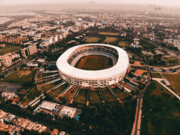
The Indian national team does not have one specific home stadium. Many stadiums across India have hosted their matches. These include the Salt Lake Stadium in Kolkata, the Jawaharlal Nehru Stadium in Delhi, and the Fatorda Stadium in Margao. Other stadiums are the Sree Kanteerava Stadium in Bangalore, the Jawaharlal Nehru Stadium in Kochi, and the Mumbai Football Arena in Mumbai. More recent venues include the Indira Gandhi Athletic Stadium in Guwahati, the Khuman Lampak Main Stadium in Imphal, the Kalinga Stadium in Bhubaneswar, the EKA Arena in Ahmedabad, and the Jawaharlal Nehru Stadium in Shillong.
Recently, the 2011 SAFF Championship and 2012 Nehru Cup were held in Delhi. The 2015 SAFF Championship was in Trivandrum International Stadium. The 2017 Hero Tri-Nation Series and 2018 Intercontinental Cup were at Mumbai Football Arena. The 2019 Intercontinental Cup was at the EKA Arena. Stadiums like Indira Gandhi Athletic Stadium, Sree Kanteerava Stadium, and Fatorda stadium have hosted AFC Asian Cup and FIFA World Cup qualifiers.
Supporters
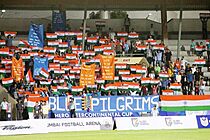
Before the 2000s, Indian football fans were spread out. They were mainly in West Bengal, North-East India, Goa, and Kerala. Fans were not organized under one group until 2017. That's when "Blue Pilgrims" was formed. It became the first organized fan club for the national team.
The Blue Pilgrims started to support the national team and the U-17 team during the 2017 U17 World Cup. This was India's first time playing in a FIFA competition. They started with about 300 fans and now have thousands. They are fans from different regions who came together to support the Blue Tigers. They call themselves "devotees" of the Blue Tigers. Their goal is to support all Indian national football teams, no matter the gender or age, wherever they play. Because of their dedication, they are called the 12th man of the team.
The Blue Pilgrims often chant: "Oh India!", "In unity we stand", "Oh India we stand for you!", and "Vande Mataram". Their songs include "Oh when the blues go marching in, I wanna be in that number!" and "Ham honge kamyab" (We shall overcome). After every match, the Blue Pilgrims celebrate with a Viking Thunder Clap with the team. Fans show the country's National flag and wear blue jerseys. They display their "Blue Pilgrims" banner and shout, "We love you, wherever you go, we follow!"
On June 2, 2018, captain Sunil Chhetri posted a video. He asked fans to come to Mumbai to support the team. This was after only 2,569 people attended a match against Chinese Taipei. India won that match 5–0, with Chhetri scoring three goals. But few people were there to celebrate. After his call, the Blue Pilgrims and other fan clubs made sure stadiums were full for the next matches. In the final of that tournament, the Blue Pilgrims displayed a 30-foot tall 3D tifo of a Blue Tiger. This was the first time such a display happened for the team.
Media Coverage
India's international games are shown on television by Star Sports and its online service, Hotstar. Before this, the AIFF had a ten-year deal with Zee Sports in 2006. This deal was part of the 'Goal 2010' plan, aiming for India to qualify for the 2010 World Cup.
Recent Matches
Here are India's match results from the last 12 months, and upcoming games.
Win Draw Loss Fixture
2024 Matches
| 3 September 2024 2024 Intercontinental Cup | India |
0–0 | Hyderabad, India | |
| 19:30 IST (UTC+05:30) | Stadium: G. M. C. Balayogi Athletic Stadium Attendance: 18,976 Referee: Mohamed Javiz (Maldives) |
| 9 September 2024 2024 Intercontinental Cup | India |
0–3 | Hyderabad, India | |
| 19:30 IST (UTC+05:30) | Stadium: G. M. C. Balayogi Athletic Stadium Attendance: 19,982 Referee: Nivon Robesh (Sri Lanka) |
| 12 October 2024 Friendly | Vietnam |
1–1 | Nam Dinh, Vietnam | |
| 18:00 UTC+7 | Bùi Vĩ Hào |
Choudhary |
Stadium: Thiên Trường Stadium Attendance: 8,239 Referee: Choi Hyunjai (South Korea) |
| 18 November 2024 Friendly | India |
1–1 | Hyderabad, India | |
| 19:30 UTC+5:30 | Bheke |
Josué |
Stadium: G. M. C. Balayogi Athletic Stadium Attendance: 15,367 Referee: Thoriq Alkatiri (Indonesia) |
2025 Matches
| 19 March 2025 Friendly | India |
3–0 | Shillong, India | |
| 19:00 UTC+5:30 |
|
Stadium: Jawaharlal Nehru Stadium Attendance: 6,798 Referee: Prajwol Chhetri (Nepal) |
| 25 March 2025 2027 ACQ – 3R | India |
0–0 | Shillong, India | |
| 19:00 UTC+5:30 | Stadium: Jawaharlal Nehru Stadium Attendance: 14,952 Referee: Hussein Abo Yehia (Lebanon) |
| 4 June 2025 Friendly | Thailand |
2–0 | Pathum Thani, Thailand | |
| 19:30 UTC+7 | Stadium: Thammasat Stadium Attendance: 2,181 Referee: Tam Ping Wun (Hong Kong) |
| 10 June 2025 2027 ACQ – 3R | Hong Kong |
1–0 | Kowloon, Hong Kong | |
| 20:00 UTC+8 | Pereira |
Stadium: Kai Tak Sports Park Attendance: 42,570 Referee: Ahmad Alaeddin (Lebanon) |
| 9 October 2025 2027 ACQ – 3R | Singapore |
v | Kallang, Singapore | |
| 20:30 UTC+8 | Stadium: National Stadium |
| 14 October 2025 2027 ACQ – 3R | India |
v | India | |
| Stadium: TBD |
| 18 November 2025 2027 ACQ – 3R | Bangladesh |
v | Sylhet, Bangladesh | |
| Stadium: Sylhet District Stadium |
2026 Matches
| 31 March 2026 2027 ACQ – 3R | India |
v | India | |
| Stadium: TBD |
Coaching Staff
Coaching History
Since India became independent, 29 different people have coached the national team. Eleven of them were from other countries. The most successful coach was Syed Abdul Rahim. He led India to gold medals in the 1951 and 1962 Asian Games. He also helped them finish fourth at the 1956 Summer Olympics.
The most successful foreign coaches were Bob Houghton and Stephen Constantine. Both helped India qualify for the AFC Asian Cup. Bob Houghton coached from 2006 to 2011. Under him, India won the Nehru Cup twice and the AFC Challenge Cup in 2008. This allowed them to play in their first AFC Asian Cup in 27 years.
After Houghton left in 2011, India's FIFA ranking dropped to its lowest ever, 173, in March 2015. But Stephen Constantine, in his second time as coach, helped the team recover. Under him, the team was unbeaten for two years (June 2016 to March 2018). They won 11 matches and drew 2. This helped them qualify for the 2019 AFC Asian Cup. He also helped the team reach a FIFA ranking of 96 in July 2017, their best in 21 years.
Current Coaching Staff
| Position | Name | Ref. |
|---|---|---|
| Head Coach | Vacant | |
| Assistant Coaches | ||
| Goalkeeping Coach | ||
| Strength & Conditioning Coach | ||
| Team Director |
Players
Current Squad
The following 25 players were called up for the AFC Asian Cup qualification match against Hong Kong in June 2025.
Caps and goals are correct as of June 10, 2025, after the match against Hong Kong.
| No. | Pos. | Player | Date of birth (age) | Caps | Goals | Club |
|---|---|---|---|---|---|---|
| 1 | GK | Vishal Kaith | 22 July 1996 | 8 | 0 | |
| 13 | GK | Gurmeet Singh Chahal | 3 December 1999 | 0 | 0 | |
| 23 | GK | Amrinder Singh | 27 May 1993 | 14 | 0 | |
|
|
||||||
| 2 | DF | Rahul Bheke (Vice-captain) | 6 December 1990 | 38 | 3 | |
| 3 | DF | Chinglensana Singh Konsham | 23 November 1996 | 12 | 0 | |
| 4 | DF | Anwar Ali | 28 August 2000 | 27 | 1 | |
| 5 | DF | Sandesh Jhingan (Captain) | 21 July 1993 | 67 | 5 | |
| 6 | DF | Ashish Rai | 27 January 1999 | 5 | 0 | |
| 12 | DF | Naorem Roshan Singh | 2 February 1999 | 12 | 0 | |
| 19 | DF | Abhishek Singh Tekcham | 2 January 2005 | 3 | 0 | |
| 21 | DF | Boris Singh Thangjam | 3 January 2000 | 4 | 0 | |
|
|
||||||
| 7 | MF | Liston Colaco | 12 November 1998 | 31 | 1 | |
| 8 | MF | Suresh Singh Wangjam | 7 August 2000 | 35 | 1 | |
| 10 | MF | Brandon Fernandes | 20 September 1994 | 32 | 0 | |
| 14 | MF | Ayush Chhetri | 16 April 2003 | 3 | 0 | |
| 15 | MF | Udanta Singh Kumam | 14 June 1996 | 51 | 2 | |
| 16 | MF | Naorem Mahesh Singh | 1 March 1999 | 24 | 3 | |
| 18 | MF | Lalengmawia Ralte | 17 October 2000 | 26 | 0 | |
| 20 | MF | Nikhil Prabhu | 2 October 2000 | 1 | 0 | |
| 22 | MF | Ashique Kuruniyan | 14 June 1997 | 38 | 2 | |
|
|
||||||
| 9 | FW | Edmund Lalrindika | 24 April 1999 | 5 | 0 | |
| 11 | FW | Sunil Chhetri | 3 August 1984 | 155 | 95 | |
| 17 | FW | Lallianzuala Chhangte | 8 June 1997 | 44 | 8 | |
| FW | Manvir Singh | 7 November 1995 | 49 | 7 | ||
| FW | Suhail Ahmad Bhat | 8 April 2005 | 1 | 0 | ||
Recent Call-ups
The following players were part of the national team in the past year but are not in the current squad.
| Pos. | Player | Date of birth (age) | Caps | Goals | Club | Latest call-up |
|---|---|---|---|---|---|---|
| GK | Hrithik Tiwari | 10 January 2002 | 0 | 0 | vs |
|
| GK | Gurpreet Singh Sandhu | 3 February 1992 | 76 | 0 | vs |
|
|
|
||||||
| DF | Mehtab Singh | 5 May 1998 | 11 | 0 | vs |
|
| DF | Subhasish Bose | 18 August 1995 | 43 | 0 | vs |
|
| DF | Hmingthanmawia Ralte | 31 May 2000 | 2 | 0 | vs |
|
| DF | Nikhil Poojary | 3 September 1995 | 29 | 1 | vs |
|
| DF | Jay Gupta | 27 September 2001 | 3 | 0 | vs |
|
|
|
||||||
| MF | Jeakson Singh Thounaojam | 21 June 2001 | 25 | 0 | vs |
|
| MF | Brison Fernandes | 17 April 2001 | 1 | 0 | vs |
|
| MF | Macarton Nickson | 19 March 2004 | 0 | 0 | vs |
|
| MF | Jithin M. S. | 16 January 1998 | 1 | 0 | vs |
|
| MF | Thoiba Singh Moirangthem | 12 December 2002 | 0 | 0 | vs |
|
| MF | Vibin Mohanan | 6 February 2003 | 1 | 0 | vs |
|
| MF | Lalrinliana Hnamte | 29 April 2003 | 1 | 0 | vs |
|
| MF | Lalthathanga Khawlhring | 30 March 1998 | 0 | 0 | vs |
|
| MF | Sahal Abdul Samad | 1 April 1997 | 39 | 3 | vs |
|
|
|
||||||
| FW | Farukh Choudhary | 8 November 1996 | 18 | 2 | vs |
|
| FW | Irfan Yadwad | 19 June 2001 | 3 | 0 | vs |
|
|
||||||
Famous Players
In the early 1900s, Gostha Pal was one of Asia's best footballers. He started playing professionally at 16 in 1911. He became India's first captain and was a great defender. In 1962, he was the first footballer to receive the Padma Shree award. In 1998, India released a postal stamp in his honor.
Later in the 1930s, players like R. Lumsden and Noor Mohammed played for India. They scored 56 goals in 17 matches during the 1938 Australia tour. Lumsden scored India's first international hat-trick.
India's first captain after independence was Dr. Talimeren Ao. He led the team at the 1948 Olympics, India's first major tournament. He also carried India's flag in London. During this time, Sailen Manna became one of India's best defenders. He captained India to their first major international trophy, the gold medal at the Asian Games in 1951. In 1953, England's Football Association named Manna among the "10 Best Skippers of the World." He received the Padma Shri in 1971.
During India's golden era (1950s and early 60s), great strikers emerged. These included Sheoo Mewalal, Neville D'Souza, Chuni Goswami, Inder Singh, and Tulsidas Balaram. Mewalal was India's main striker at the 1948 and 1952 Olympics and the 1951 Asian Games. He was the top scorer at the 1951 Asian Games with four goals. Mewalal scored India's first hat-trick after independence against Burma in 1952.
D'Souza became the first Asian player to score a hat-trick at the Olympic Games. He scored it against Australia at the 1956 Olympics. Goswami played for India at the 1958 Asian Games and 1960 Olympics. He captained the team at the 1962 Asian Games and 1964 AFC Asian Cup. He was honored with the Padma Shri and named "Best Striker of Asia" in 1962.
P. K. Banerjee, a winger, played at the 1956 Olympics and captained the team at the 1960 Olympics. He was named the best "Indian player of the 20th Century." Peter Thangaraj was India's main goalkeeper during the golden era. He was named the best "Indian keeper of the 20th Century" by IFFHS. P. K. Banerjee received the Padma Shri in 1990. In 2004, FIFA gave him the "FIFA Centennial Order of Merit" Award, FIFA's highest honor.
From the 1970s to the 2000s, India's results declined. But players like Syed Nayeemuddin still shone. He led India to a bronze medal at the 1970 Asian Games. In the 1990s, I. M. Vijayan, India's best player then, played 72 times and scored 29 goals. He also captained the team.

In 1995, Bhaichung Bhutia joined the Indian team. With him, India qualified for the AFC Asian Cup after 27 years. He was the team captain for over ten years. Bhutia is considered one of India's greatest footballers. He is the second-most-capped player with 84 games and scored 27 goals. He received the Padma Shri in 2008.
Under Bhutia's captaincy, Sunil Chhetri started playing for India. Chhetri is now the only Indian footballer to play 100 international matches. He is also India's all-time top goal-scorer. Chhetri led the team to many wins, including qualifying for the AFC Asian Cup. Under his leadership, the team reached a FIFA ranking of 96, their best in 21 years. He is the only Indian striker to score four hat-tricks for India. Sunil Chhetri is the third-highest international goalscorer among active players, behind only Cristiano Ronaldo and Lionel Messi. He is also the most-capped player and the all-time top goalscorer for India.
Team Achievements
Continental Trophies
- AFC Asian Cup
- Second Place (1): 1964
- AFC Challenge Cup
- Champions (1): 2008
- Asian Games
- Gold Medal (2): 1951, 1962
- Bronze Medal (1): 1970
Regional Trophies
- SAFF Championship
- Champions (8): 1993, 1997, 1999, 2005, 2011, 2015, 2021, 2023
- Second Place (4): 1995, 2008, 2013, 2018
- Third Place (1): 2003
- South Asian Games
- Gold Medal (3): 1985, 1987, 1995
- Silver Medal (1): 1993
- Bronze Medal (2): 1989, 1999

Images for kids
-
The Indian team that played against France at the 1948 Olympics.
-
The Indian squad before leaving for Jakarta and the 1962 Asian Games.
-
India playing against Argentina at the Eden Gardens during the 1984 Nehru Cup.
-
India playing against Syria at the 2007 Nehru Cup.
-
The captain of Indian Football team, Bhaichung Bhutia, celebrating with other players after winning the 2007 Nehru Cup final.
-
India's starting team in a friendly match against Puerto Rico in September 2016.
-
India playing against Thailand at the 2019 AFC Asian Cup.
-
India's playing team against Thailand at the 2019 AFC Asian Cup.
-
Odisha Chief Minister Naveen Patnaik giving the 2023 Intercontinental Cup trophy to Sunil Chhetri.
-
The Salt Lake Stadium in Kolkata.
-
Blue Pilgrims showing the national flag and their banners at the 2018 Intercontinental Cup.
-
Sunil Chhetri celebrating after scoring a goal.
-
A poster for the India vs Israel match at the 1964 Asian Cup.
See also
 In Spanish: Selección de fútbol de India para niños
In Spanish: Selección de fútbol de India para niños
- Football in India
 | Misty Copeland |
 | Raven Wilkinson |
 | Debra Austin |
 | Aesha Ash |


